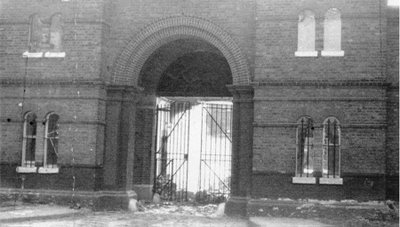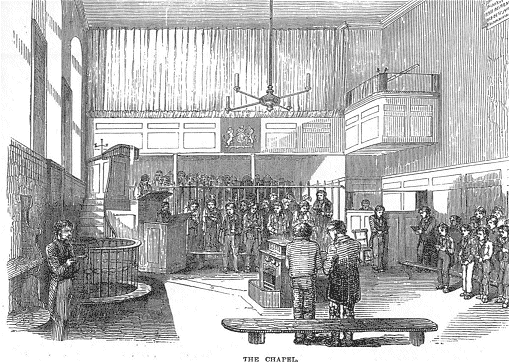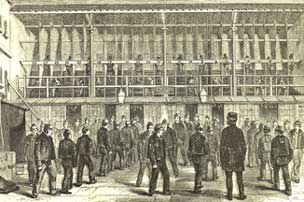Early English worried about the rising crime rate. They were firm believers in punishment for criminals; the common punishments included transportation – sending the offender to America, Australia or Van Diemens Land (Tasmania) – or execution.
By the 1830s people were having doubts about both these punishments; Australia was complaining that they did not want to be the dumping ground for Britain’s criminals. Thus, English turned to a new solution prisons. By the beginning of the Victorian era, lots of new prisons were built and old ones extended.

Living conditions in Victorian prisons
The Victorians felt that if prison was to be a punishment, then it must offer a deterrent climate, so people would want to avoid being sent there. Thus, Prisons at this time tended to be damp, unhealthy, unsanitary, overcrowded. Most were often in old buildings, such as old castles.
The food was poor and conditions uncomfortable. All kinds of prisoners – men, women, children, the mentally ill, serious criminals, petty criminals, people awaiting trial – were mixed in together, as at Coldbath Fields. Each prison was run by the gaoler in his own way. He made up the rules. Paying a goaler could buy extra privileges; otherwise the basic fare was grim. Sometimes, they even had to pay the gaoler to be let out, once the sentence was finished.

Once inside, prisoners had to be made to face up to their own faults. Many of the activities on which prisoners spent their time, had no purpose other than the effort of carrying out the punishment itself. Some prisons practised segregation and holding prisoners in isolation, and keeping them silent so they could reflect their actions. Not surprisingly, many went mad under this system.
By the 1850s, it was believed that many criminals were habitual criminals and nothing would change them. They just had to be scared enough by prison never to offend again. The Silent System, associated with the 1865 Prisons Act and the Assistant Director of Prisons, Sir Edmund du Cane, who promised the public that prisoners would get “Hard Labour, Hard Fare, and Hard Board”.
The purpose of the silent system was to break convicts’ wills by long, pointless hard labour. Thus, they were set demoralising tasks, such as Turning the Crank, Walking a treadwheel or Picking Oakum (separating strands of rope). This changed in 1902 when the treadwheel was banned.

Prisons were also used as Debtors Prisons, also known as Workhouses or Poorhouses. Debtors prison was a place where they took people who couldn’t pay their taxes, rent or debts. These places were commonly workhouses where they would make potato sacks, baskets and other mass-produced items, and their salaries would go to clearing their debts. Normally, if a debtor had a family, then they would accompany him in prison.
Between the 1860s and 1880s, prison conditions underwent reformation. People wanted to reform prison for different reasons. Christian reformers felt that prisoners were also God’s creatures and deserved to be treated decently. Rational reformers believed that the purpose of prison was to punish and reform, not to kill prisoners with disease or teach them how to be better criminals.
In some prisons, the cooking was very good, much better than in most ordinary inns. It seemed that the convicts were not just well fed, but fed even better than some non-criminal citizens. Besides food, there were other areas where English convicts seemed to far better than non-convicts.
The convicts got to exercise, had regular habits, were sufficiently fed, were healthier than the normal population and didn’t have to worry about keeping a job. Once a week, every man had an excellent bath. The bedding was good, the whole building was warm and every corner was thoroughly ventilated. It provided schooling for the criminals.
They were also allowed to borrow books from an excellent library in the prison. It seemed more advantageous for an Englishman to commit a crime, thereby be convicted to prison, where he could obtain better food, baths, and good warm lodging, than if he were struggling on the streets of London.